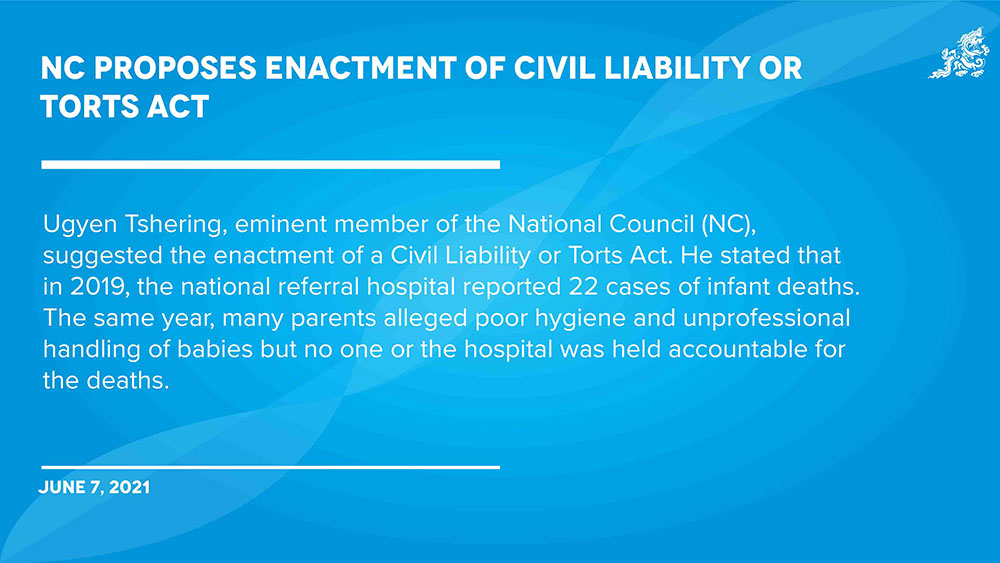To hold accountability for mishaps
Citing 16 examples where mishaps occurred in the recent past, but no accountability was held, National Council’s (NC) eminent member, Ugyen Tshering, proposed to enact a Civil Liability or Torts Act.
He said that although many unfortunate accidents occurred resulting in death, injury, and loss of public property, concerned parties have refused to take responsibility and relevant authorities failed to take necessary action against the tortfeasors.
Ugyen Tshering, who is also a deputy chairperson of the Legislative Committee, said that the Act, if enacted would address the ongoing predicament faced by the victims of civil wrongs.
“The victims have not been remedied notwithstanding the fact that the harms or injuries suffered have been grave and irreparable,” he said. “Although there are relevant provisions for the initiation of criminal proceedings, no criminal prosecutions have been undertaken so far to hold responsible individuals or agencies or companies accountable for the wrongs committed.”
He said victims, in many cases, are not compensated.
He cited the example where the Neonatal Intensive Care Unit (NICU) of the national referral hospital recorded 22 cases of infant deaths in 2019 and many parents alleged poor hygiene practices, and unprofessional to handle newborn babies. “But no one or the hospital was held accountable for the deaths.”
The committee submitted that there also weak implementation and enforcement of the laws by the relevant agencies such as police, Office of the Attorney General (OAG) and the courts, which lead to people losing trust in the legal system.
“Which is why there is a need for the House to come out with a resolution to mandate the relevant authorities to implement the laws in its true form,” Ugyen Tshering said. “In law, such perilous or unreasonable conducts, which causes injury to others are known as torts or civil wrongs.”
He said that the Tort Act is necessary to institute and enhance corrective and restorative justice for the victims and this proposed legislation will bring about accountability in the system.
The proposed legislation is also expected to place a sense of responsibility amongst relevant or responsible individuals, officials, agencies, business entities, as well as citizens.
In addition to the criminal prosecution that may be initiated against those who have been negligent or failed in their duties, the Tort Act will give victims option to file a civil or tort suit to seek remedies for wrongful death, injury or loss of property.
“This is not possible today, as they cannot file for a separate tort suit to be compensated for the harm suffered in absence of separate specific tort law,” Ugyen Tshering submitted. “If the person has a chance to suit tort, the victim would not have to wait for a lengthy criminal process.”
He also said a woman, who worked in a drayang and filed a rape case, is still waiting for justice because she is still waiting for the DNA report sent abroad. “If the Act is enacted, she could have an option to sue for tort.”
In Bhutan, although there are few tort provisions scattered in few legislations, they are mostly concerned with the criminal prosecution and sentencing of the tortfeasor or defendant.
However, deliberating almost for three hours and about 19 members who shared various views in regard to the enactment of the new Bill, the House decided to discuss further on the proposed Act.
The Legislative Committee was asked to table the Bill in the later sittings.
Although a majority of the members agreed with the proposal, some of the members expressed there was a need to weigh the pros and cons of such a law so that people do not take advantage of it.
A few members shared that it was important to see if this law could be provisioned in the existing laws as a new section or enact as a specific Act itself.
By Yangchen C Rinzin
Edited by Tashi Dema


